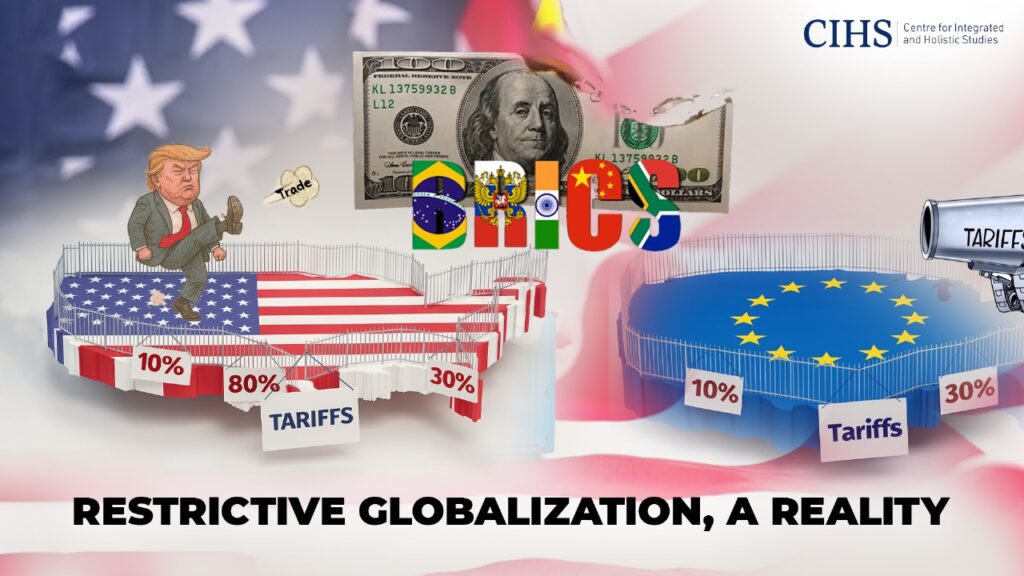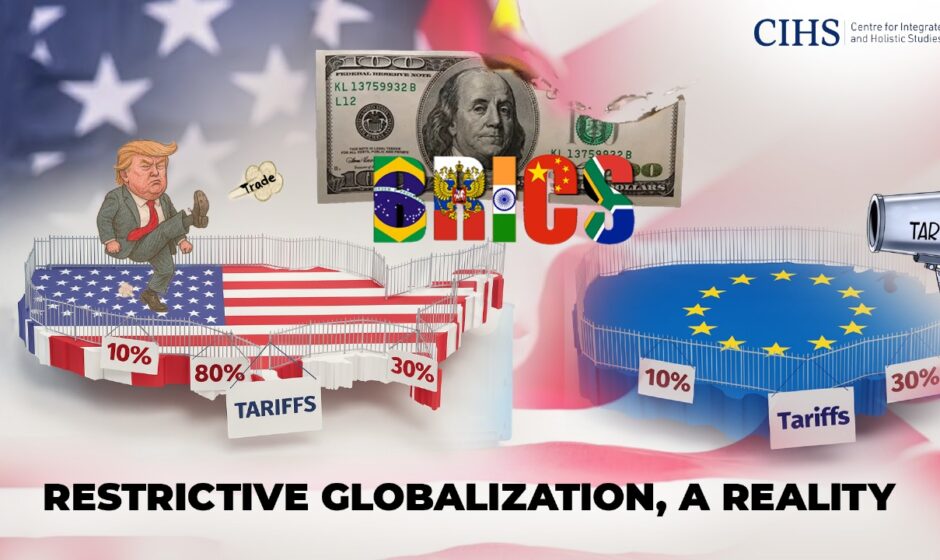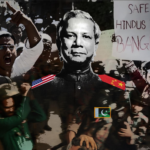From tariff wars, currencies slugfest to restrictive market dynamics is redefining globalization. Giving spiritual spread to materialistic play may be the option.
K.A.Badarinath
A couple of months into Republican Presidency, Donald J Trump has stood his reputation of being a disruptor of trade, investments and global economic order.

This disruption may not be limited to trade and investment related engagement. Currency markets would also feel the heat and extend the churn to both debt and equity markets.
Come August 1, about a dozen nations will await what’s in store for them in terms of tariffs to be slapped by President Trump. Given the kind of statements made by Republican White House, the upheaval and its impact will be felt all over.
From Bharat’s perspective, we will have to redefine globalization as hitherto understood from western perspective. From tariffs on individual products to country-specific duties, Donald Trump is all set to rewrite the way trade would be conducted across geographies.
US President announced differential tariff regimes for both strategic partners and others. Beginning August 1, duties slapped on Japan and South Korea was 25 per cent across the board without exception. Duties on South Africa were a wee-bit higher at 30 per cent on exports ranging from precious stones, diamonds to metals.
Letters despatched to 14 countries in last couple of days has slapped huge duties on exports to US ranging from 25 to 40 per cent on goods and services consumed by America from Thailand, Myanmar, Laos, Cambodia, Serbia, Indonesia, Malaysia, Bosnia and Herzigovina.
Well, over and above, 10 per cent on each of BRICS nations that have committed to doing business either in their own currency or non-dollar terms. US President Trump sees this as a big threat to hegemony of American Green back.
Three to four options have been exercised by countries across the spectrum doing business or trade deals with US. Many countries have decided to adopt a ‘wait and watch’ approach hoping that President Trump would wind down on these tariff walls set up to protect domestic industry and service providers.
Some including Bharat, South Korea and Japan have owed to negotiate tariffs across the table to make things work before the August 1 deadline.
For instance, US Republican administration has targeted export of steel, iron, aluminium and copper from Bharat with 50 per cent import duty. On pharmaceutical products, US has threatened to slap 200 per cent tariff. Trump administration is pushing levers to gain access to Bharat’s huge agriculture market and dairy apart from selling aggressively genetically modified products. So far, New Delhi has not blinked. It’s a huge relief to witness the hard bargains sought to be made by Piyush Goyal and team.
There’s a lot written about Trump’s flip flop on tariffs. But, European Union is no saint. Border carbon tax to be levied by EU to essentially protect its domestic industry is again a big disruptor of global trade. Carbon Border Adjustment Mechanism (CBAM) will become operative beginning 2026. Steel, cement, fertilizers and electronic goods imported by EU member countries will slap a carbon tax.
BRICS including India rejected the impost as ‘unilateral’, ‘restrictive’ and ‘artificial trade barrier’ in the guise of ‘environmental concerns’. China and India in particular would feel the impact of this carbon tax big time.
It’s not tariffs alone that are turning the head on globalization preached by Western powers in last quarter of a century or more. Free markets, unrestricted trade and services, movement of people that were once hallmark of ‘free and globalized world’ are getting redefined thanks to protective and restrictive policies of western powers.
Tariff wars alone may not kick the basic western concept of globalized world. These wars are extending beyond trading blocks, groups that are considered regional, multi-lateral and pluri-lateral in membership, nature of trade, investment and economic engagement.
For instance, currency markets are set to experience huge upheaval if the 13-member BRICS group goes ahead with its own currency or plan to trade in respective currencies rather than linking these deals to US dollar.
This has upset President Trump as a ‘very anti-American move’ and threatened with 10 per cent additional duties on BRICS and its allies. As on date, over 90 per cent trade deals are settled in US dollars and about 58 per reserves are in American green back. Increasingly, ‘de-dollarization’ is gaining ground to explore an alternative reserve currency.
While differences on common BRICS currency have delayed the move, country specific currency deals have gained momentum. Gold-back currency is what the BRICS seems to be exploring even as India is set to take over the group’s presidency. Needless to say, Bharat as chair of BRICS has a big role to play in re-balancing its own and group’s interests vis-à-vis the European Union and US.
Large energy deals between China and Russia have been squared off in Roubles and Yuan. Bharat has paid for oil imports from Russia in rupees, Yuan and even Dirhams. Hence, there’s no reason to dis-believe that local currencies cannot gain predominance and dislodge the US dollar.
It’s not just duties and currencies market that get re-defined in the ‘neo-global liberalized world’. Second World War era Bretton Woods institutions role may also have to be redefined taking on board the new reality of restrictive trade, investments, diversified currencies that will extend to movement of skilled workers.
Multi-lateral organizations like World Bank, IMF, WHO or for that matter even United Nations may have to look for re-defined role, fresh mandate and projects to keep themselves relevant taking on board the new reality. Groups like Quad and BRICS will have to find ways to deal with emerging socio-economic realities.
Globalization from western perspective and agenda has turned a full circle. It needs rejig. Going beyond entrenched economic models that are getting challenged is what needs to be done. Finding new rhythm and song in world affairs is something that may have to be worked out.
Spiritual globalization going beyond markets and dollars may be the option.
(Author is Director & Chief Executive of New Delhi based non-partisan think tank, Centre for Integrated and Holistic Studies)



